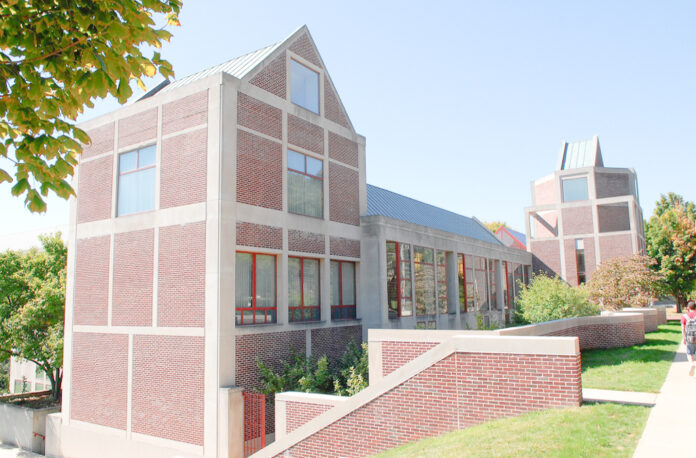
Robert Geddes, architect of Muhlenberg’s Harry C. Trexler Library, sadly passed away of natural causes at age 99 on Feb. 13, 2023 in his home outside of Princeton, New Jersey. He was a renowned architect, educator, planner and writer. Geddes made monumental contributions to the communities where his projects were located.
Geddes was born on Dec. 7, 1923, to Louis and Kate Geddes, both of Ukrainian-Jewish descent. Though he was born in Philadelphia, he moved to New Jersey soon after, while also living in Los Angeles for several years in his early life. He studied at the University of California, Berkeley and Yale University for his undergraduate degree, but his time at Yale was interrupted by three years in the military. He eventually earned his bachelor’s of architecture from Harvard University’s Graduate School of Design, which is now considered to be his master’s degree, as Harvard’s Graduate School of Design now only offers Geddes’ program at the graduate level. Further, he is the recipient of various honorary doctorate degrees from New Jersey Institute of Technology, City University of New York and Princeton University.
Though he is most commonly recognized as a successful and influential architect, he was also an educator himself. He began his teaching career in 1961 at the University of Pennsylvania School of Design, where he taught architecture and civic design. In 1965 he became the first dean of the School of Architecture at Princeton University, a position he held for over 17 years. During his time in the administration, the School of Architecture began admitting women as students. Soon after his time at Princeton, he took the position of Henry Luce Professor of Architecture, Urbanism, and History at New York University until 1998, when he retired from education.
During his time as an educator, he also had an influential career as an architect. Beginning in 1953, he co-founded an architectural practice that has offices in Philadelphia and Princeton. They competed in international competitions, making a global impact on architectural design choices. He also worked on numerous domestic projects, including the Police Headquarters of Philadelphia, Hill Hall at Rutgers University-New Brunswick and—arguably most famously—the Dining Hall and Birch Garden quad and the Institute for Advanced Study in Princeton.
Geddes clearly had a drastic impact on innumerable amounts of people throughout the nation, but he also left quite the impression on Muhlenberg College, being the architect of Trexler Library. What is now the Haas College Center once served as the College’s library. The word “library” can still be seen on the front of the building. By the late 20th century, it was clear that Haas Library was no longer feasible to use, as Muhlenberg’s book and document collection was rapidly growing, so a completely new building was in the works.
Muhlenberg also wanted to further distance itself from the old, Gothic style of architecture that can be seen in some of the older buildings on campus, including what was then the Haas Library. The Baker Center for the Arts was Muhlenberg’s first step in this process, and there were hopes that the building of a new library would achieve the goal of modernization.
Geddes made it possible for Muhlenberg to take a massive stride forward, as his designs allowed for more than double the space they had in their previous library. This opened the door for Muhlenberg students to have a space on campus that fit their needs and to have the necessary resources readily available for their use.
Not only did Geddes design Trexler Library, but he also decided where on Muhlenberg’s campus the library would best fit. Originally, eight sites on campus were being considered, but Geddes decided to build it on what was previously considered Hagen Field. Before Trexler was built, this space served as the field for the women’s field hockey team.
Geddes had an undeniable impact on Muhlenberg College, and helped propel Muhlenberg College forward in being more accommodating to its growing number of students, while also giving the College an architectural design that could carry them into the 21st century and beyond. Extending beyond Geddes’ influence on Muhlenberg, he created a permanent impact on his students, fellow architects and communities that have been graced by his expertise.





















